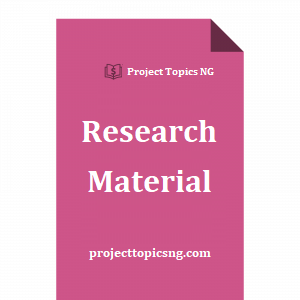Brief Introduction
This chapter deals with the Background of the Study, Statement of Problem, Problem of Study, Significance of the Study, Research Question, Limitation of the study, and Definitions of Terms.
The National Policy on Education (NPE) introduced some noble ideas at Channeling Education to the development of Nigeria’s economic, political, sociological, and human resources. One of the innovative ideas in the policy is the liberalization of the Educational assessment and evaluation by using them in part or in whole on continuous assessment of the progress of the individual (Federal Republic of Nigeria F.R.N 2004)
Prior to the institution of continuous assessment procedure of evaluation, one-short. The summative evaluation was practiced under this system of assessment emphasis is on decisions at the end of the term or year. One shortcoming of this practice is that it is too late to help pupils or students improve on their learning because most of them would be going on to their classes, courses or topics. As a result, Education System (including the pupils, the teachers, the curricula, and the administrators) is denied an opportunity for meaningful full growth. It is unwise and unnecessary to deny the educational system this essential feedback.
Table of Content
Title page
Approval certification
Certification
Dedication
Acknowledgment
Table of contents
Abstract
Chapter I:
INTRODUCTION
1.1 Background of the study
1.2 Statement of the problems
1.3 Purpose of the study
1.4 Significance of the study
1.5 Scope of the Study
1.6 Research Question
1.7 Limitation of the study
1.8 Definition of terms
Chapter II:
LITERATURE REVIEW
2.1 Evaluation in social sciences
2.2 Rationale for Avocation Continuous Assessment in Nigeria Schools
2.3 Meaning of Continuous Assessment
2.4 Characteristics of continuous Assessment
2.5 Problems of Effective Implementation of Continuous Assessment in Economics
2.6 Strategies for Effective Implementation of Continuous Assessment in Economics
2.7 Summary of Literature Review
Chapter III:
RESEARCH METHODS
3.1 Research Design
3.2 Area of Study
3.3 Population of study
3.4 Sample and Sampling techniques
3.5 Instrument for Data Collection
3.6 Validation of the Instrument
3.7 Reliability of the Instrument
3.8 Method of Data Collection
3.9 Method of Data Analysis
Chapter IV:
DATA PRESENTATION AND ANALYSIS
4.1 Research Question
Chapter V:
SUMMARY OF FINDINGS, CONCLUSION,IMPLICATIONS, AND RECOMMENDATION
5.1 Summary of Findings
5.2 Conclusion of Findings
5.3 Implications of the findings
5.4 Recommendation
5.5 Suggestion for further studies
REFERENCES
APPENDIX


